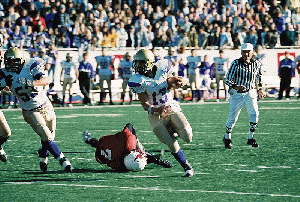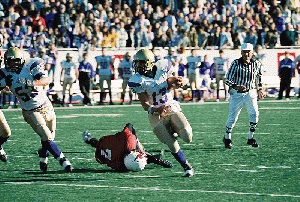
Football 100
(Image by (From Wikimedia) TuesdaysWithJesse, Author: TuesdaysWithJesse) Details Source DMCA

Football 100
(Image by (From Wikimedia) TuesdaysWithJesse, Author: TuesdaysWithJesse) Details Source DMCA
Commercialized college sports encourage hypocrisy, corrupt behavior and cynicism. The Oxford Dictionary defines hypocrisy as "the practice of claiming to have moral standards or beliefs to which one's own behavior does not conform". While some educators emphasize character development and others focus on careers, most Div. I and II university presidents and boards of regents would agree with Andres Fortuno that college should "prepare individuals for productive contribution" (careers) "through character development". [1] Their behavior, however, does not conform to the moral standard implied.
Commercialized college sports do not develop character. As for careers, the relatively few "student athletes" that find careers in professional sports would find these careers -- based on their quickness, coordination, speed and strength -- if there were no colleges. The typical fate of many college athletes is to find themselves with neither degrees nor careers. For presidents and boards of regents and chancellors to tolerate commercialized sports teams on their campuses is hypocritical behavior. [2]
Commercialized college sports also encourage corrupt behavior. Corruption, according to Transparency International's "Corruption Perceptions Index," is the use of public resources for private gain. Corruption is often, but not always, illegal. However, the use of resources contrary to law or regulation is almost always, in the final analysis, for private gain. The ability of money to buy (or to attempt to buy) a successful sports team has created a situation in which coaches and athletes are, to a large extent, for sale to the highest bidder. This is appropriate in professional sports where the money involved is private and not public. It may also be appropriate in private schools. However, it is not appropriate in our public universities. It is corrupt behavior for coaches and university presidents to use public resources for their own aggrandizement rather than to improve the quality of higher education.
Almost all of us agree that we should avoid the over regulation of private compensation. But the compensation of coaches employed by public universities is not private. This money, in part, comes out of our pockets and out of the pockets of college students. However, the gross overpayment of coaches and the various scandals at US universities do not occur because the presidents and coaches involved have corrupt natures. They occur because the commercialization of college sports nurtures corruption in normally decent human beings.
The Penn State Scandal
The scandal at Penn State is a good example. This scandal was not just about pedophilia. It was about a basically decent football coach whose absurd salary and celebrity status; combined with the near-worship he received for decades from Penn State students, faculty and administrators -- to produce delusional behavior. These circumstances seduced him into believing, like Mr. Nixon before him, that he could do no wrong. He evidently believed that he could tolerate child abuse in his department - and by doing so avoid tarnishing his own and PSU's reputations. He also appeared to believe his power and position to be so great that his decisions were above question by his administrative superiors. The PSU scandal was horrific due to the cruelty and abhorrence of the guilty assistant coach's behavior.
The consequences of commercialized sports at other Div. I and II schools are usually neither horrific nor even visible. "Student athlete's" grades are buttressed. Student athletes (and students) receive credit for "gut" courses that would not have existed without the pressures of commercialized sports. Student athletes receive illegal compensation. A head coach declines to speak (or to permit any of his assistants to waste their time speaking) to a conference of inner-city youth. A professor, as he grades an essay written by a "student athlete," reflects on the love of his colleagues for the university's sports teams. These offences and potential offenses, as a general thing, are known only to their perpetrators. In the rare cases where they become known to others, they are, unfortunately, treated as trivial. Nevertheless, taken in their entirety they have a significant negative effect on the characters of both faculty members and students - and on US higher education.
Commercialized College Sports Produces Cynical Attitudes
Cynicism is defined by Miriam Webster as the belief that "people are generally selfish and dishonest". Presidents and boards of regents accept their positions and their compensation with the implicit understanding that they will do their best to improve the quality of education in their universities. Faculties and students are aware of this implicit understanding. Yet the presidents, boards of regents and chancellors pay coaches absurd salaries and build sports facilities with money that might have been used to reduce tuitions and improve the quality of education. This is dishonest behavior and justifies cynicism on the part of students, faculty members and parents. This cynicism is especially noxious due to the high status and respectability of presidents, boards of regents and chancellors.
Coaches
accept millions of dollars [3]
in salaries and bonuses while their
"student athletes" are compensated only by educations they often fail to
complete. This, while it is no more selfish than any other commercial activity,
is inappropriate in public institutions devoted to education. College sports should not be a commercial
activity.
Most of our presidents, boards of regents and chancellors probably agree that education at all levels should encourage students to develop character traits that help them think for themselves and lead them to reflect on their goals. They certainly hope that the educations they provide will help students find useful and satisfying careers. One of the ways that presidents, boards of regents and chancellors can help students develop positive character traits is to model these traits for them. It is a weakness of our system of higher education that it encourages behavior on the part of these leaders that is not helpful to students in this way. This is not the fault of the individuals concerned. It is the fault of commercialization of college sports.
[1] Andres Fortuno, "The purpose of higher education is to create prepared minds," in Evolution, accessed June 27, 2015
(Note: You can view every article as one long page if you sign up as an Advocate Member, or higher).




